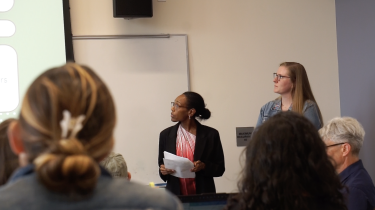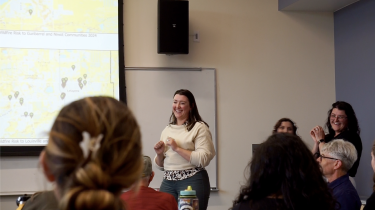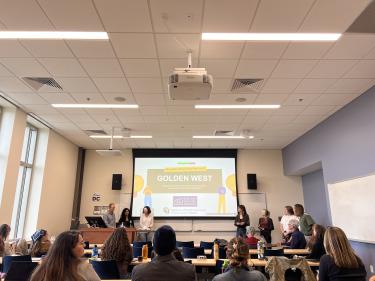2025 Urban Resilience and Sustainability Clinic Presentation Recap
On Thursday, the MENV Urban Resilience and Sustainability Clinic students delivered their final presentations. The Clinic model seeks to bring the ideas and resources of supervised MENV students to bear on real-world, real-time resilience and sustainability challenges facing Colorado communities and organizations, emphasizing supporting underserved and at-risk populations and places. Through research, written reports, stakeholder interviews, and other methods, MENV students gain critical skills and knowledge while providing valuable professional services to community partners.
Following up on the Spring 2022 URS Clinic with Boulder Housing Partners (BHP) and Boulder County Housing Authority (BCHA), the Spring 2025 Clinic again teamed up with BHP and BCHA to undertake a set of discrete but related projects aimed at advancing each organization's resilience, sustainability, and climate goals.

To start, the first BCHA team showcased their work on sustainability and policy recommendations for Willoughby Corners in Lafayette, CO. Willoughby Corners, when complete, will be home to 400 affordable housing units made of apartment-style, multi-family, and for-sale homes. Throughout their findings, the team determined high-level recommendations for BCHA based on successful case studies from around the US. Recommendations include: establishing objective design standards; determining pre-approved housing plans/housing types catalogs; facilitating land banking and community land trusts; providing technical assistance and digital infrastructure (to support the design and development process); and defining staff succession plans. Through these recommendations, the team believes that the county could reduce costs during the entitlement process, improve project efficiency, and, support the BCHA goal of housing more folks in Boulder County.

Next, we heard from the second BCHA team that focused on creating a disaster response plan for all BCHA properties. Increases in climate hazards present a variety of potential impacts to BCHA properties and populations. To best understand the hazard impacts, the team performed GIS analyses for extreme heat, air quality, wildfire, extreme snow, flood, and drought. This data, cross-referenced with staff survey data, helped the team determine high-vulnerability areas to inform prioritization for BCHA actions. Large multi-family units, mountain properties, and senior living facilities ranked highest among vulnerable as determined by the team’s risk priority matrix. The team included this matrix and other resources in their Climate Risk Assessment & Mitigation Report. At a high level, the team recommended that: 1. BCHA work with the Office of Disaster Management to create an emergency preparedness and response plan; 2. BCHA trains staff on the plan; 3. BCHA provides preparedness training for residents; 4. BCHA utilizes partnerships across Boulder County to support their work; and 5. BCHA prioritizes physical resilience measures and properties using resources like the team’s property manager resilience checklist.

Lastly, the BHP team presented their work with BHP’s newest property, Golden West. Golden West is a 250 resident 62 year-old+ living community located in South Boulder. In 2025, BHP acquired the property to maintain its current community and extend its reach as a resilience hub through community support and a decarbonization plan. “Golden West has the opportunity to serve as a resilience hub not just for its residents, but for the entire BHP portfolio. [The project goal is to] provide resources, support, and services to the BHP community on blue sky days and in extreme climate events.” To meet this goal, the team first met with residents to ensure there was a need/desire for this type of work from the community members. Focus groups and survey data determined the following recommendations: supporting food access in the community through streamlined grocery deliveries and pantry support; engaging with CU Serves to increase student community support in the facility where needed; investing in generators; installing filtration units; expanding emergency communication; formalizing disaster preparedness communication materials; and working with various transportation services to ensure safe and reliable rides in the event of an emergency. In their decarbonization efforts, the team identified low-, medium-, and high-lift ways the property can become net-zero. BHP carried out phase one tasks like LED retrofitting, replacement with low-flow fixtures, and thermostat upgrades. Phases two and three include ideas like electrification of the mezzanine building and full systems upgrades for their air-to-water heat pump.
It was incredible to see the work that our students did in just one semester! Each community partner from BCHA and BHP commended the students' work and reiterated that this work would support them in implementing goal-aligned strategies for their organization's future work. Following the presentation, Tanya Jimenez, Senior Housing Developer at BCHA wrote, "Thank you all for your deliverables. I’m so happy we got to work with you all this semester. We were all so impressed by your research and work. Thank you, again!"

